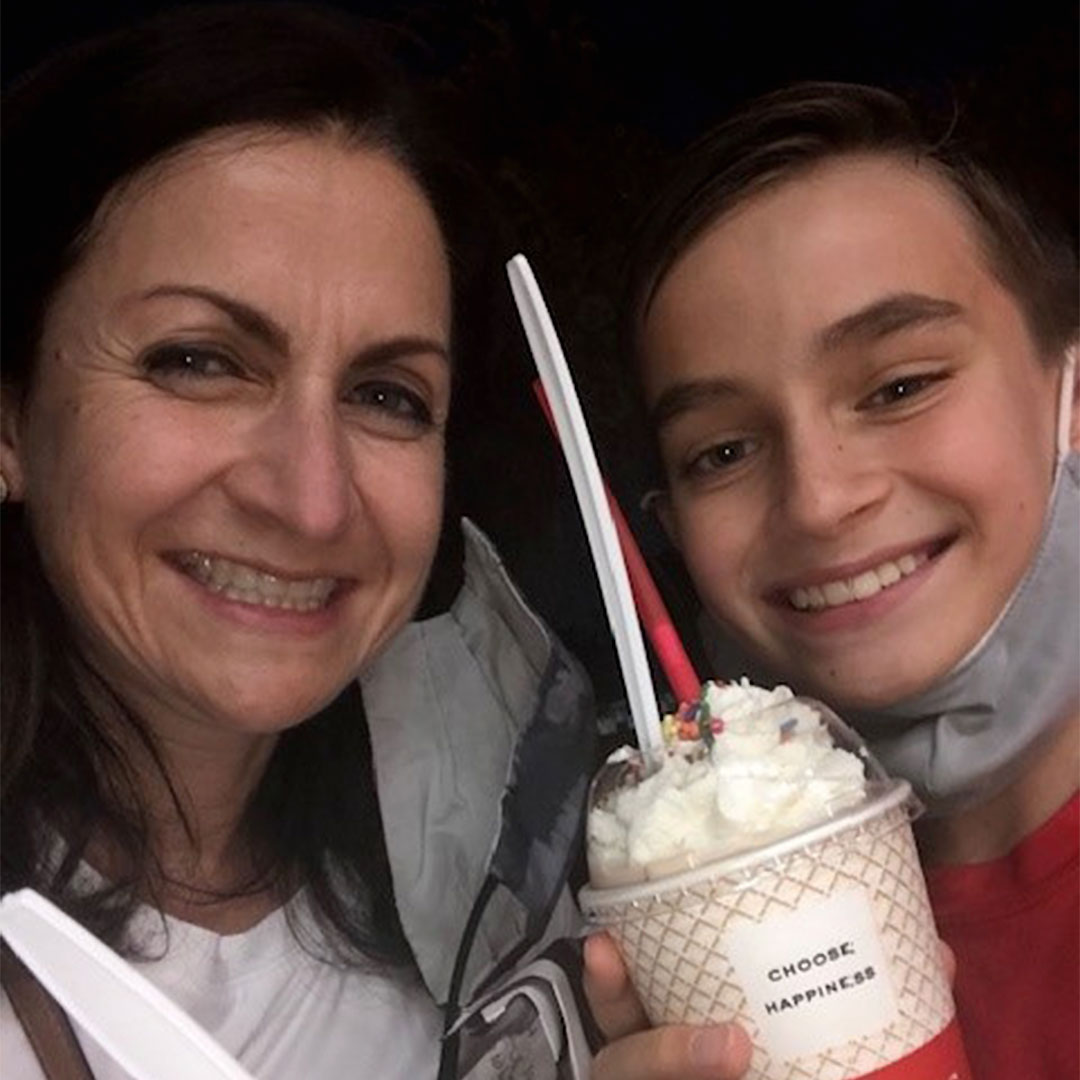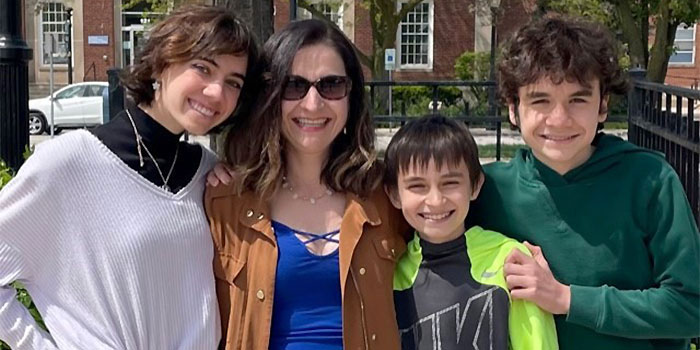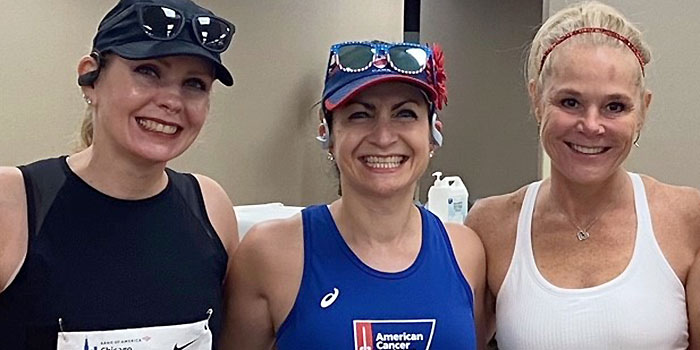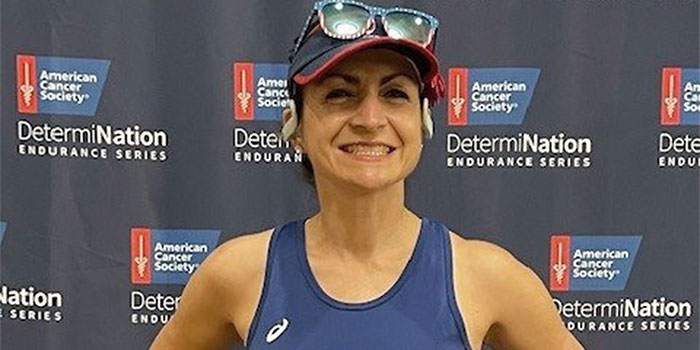


The heartbreak of losing her mother to cancer and a heart defect that caused a stroke have shaped Dr. Barbara Buttin’s approach to patient care.
It’s often said that doctors make the worst patients. Barbara Buttin, MD, would agree, but she also found that her experience as a patient has made her a better doctor.
Driven by her own mother’s traumatic battle with metastatic breast cancer, Dr. Buttin made it her mission to treat patients with respect, dignity and compassion. But a stroke, an undiagnosed heart condition and her journey as a patient forever changed her approach to patient care.
“When you’re a doctor who has seen the patient end of things, it gives you an extra level of empathy and an extra skill set you can use as a navigator and an advocate for your patients to help them get through a difficult time and a difficult decision-making process,” says Dr. Buttin, Gynecologic Oncologist at City of Hope Chicago. “I may have a little bit of an advantage over someone who hasn’t gone through a difficult medical situation and come through it on the other side.”

On a hot August morning in 2017, Dr. Buttin was floating in Lake Michigan amid a sea of endurance athletes awaiting the start of the Chicago Triathlon. Swimming is the first leg of the three-discipline event, and the lake shore was lined with spectators, family and friends. Her son Alex also was competing that day. For Dr. Buttin, endurance events like marathons and triathlons are a passion second only to patient care.
But something wasn’t right, she said. When the signal sounded to start the event, Dr. Buttin felt like she was in a fog. She had a severe headache and felt sluggish. Her friends on shore were urging her on while also wondering why she was struggling.
“I really couldn’t get myself together,” she recalls. “It was a really hot day, in the 90s. I had a headache, and I didn’t feel well. And I thought it was not going to be a good day.”
She had no idea.
Those who compete in endurance events and road races know that just finishing is the first order of business. And she did. “I got through all that,” she says. “I was not feeling very well, and I did not do very well, but I got through the whole race.”
Still, even after the race, the headache persisted, and new symptoms arose.
“I couldn’t see straight,” Dr. Buttin says. “I thought it was heat exhaustion and a migraine. That was my self-diagnosis. Needless to say, I didn’t do anything about it. I went home, I went to bed, I went to work the next day. Back to the grind.
“Typical. This is how we are as physicians—the worst patients ever. We ignore all our symptoms.”
As the days dragged by, the symptoms became too pronounced to ignore. She saw letters in reverse order, and holes emerged in her vision. “I could tell there was something really wrong with my eyes,” she said. A visit to an ophthalmology practice initially found no cause for her vision issues, until the last visit of the day, with a neuro-ophthalmologist. “’He looked at me for about two minutes,” she said. “’You had a stroke,’ he told me. Just like that.”
Long before she came to City of Hope Chicago in 2021, Dr. Barbara Buttin was practicing the patient-centered approach that's central to City of Hope model of care.
Born in Dusseldorf, Germany, she first visited to the United States as a 16-year-old high school student. “We were encouraged to spend time in other countries and study abroad,” she says. “I fell in love with it. I had the best time, and I met some friends and spent some holidays with them and decided that it would be fun and finish school here.”
After getting an international baccalaureate high school degree in Germany, she returned to the United States and received a bachelor’s degree in history from the University of Pennsylvania. Then it was on to medical school at Drexel University in Philadelphia. But during her residency at the Washington University School of Medicine in St. Louis, Dr. Buttin learned her mother had been diagnosed with metastatic breast cancer. She suspended her residency and returned to Germany.
“My mom’s illness came on really quickly,” she says. “She was diagnosed with metastatic breast cancer and only lived six months. Her condition became terminal pretty quickly. So, there was not much we could do. That was a very traumatic time.”
The experience not only determined the direction of her medical career but laid the foundation for how she approached patient care, she says. City of Hope embraces the guiding philosophy of treating patients the way you'd want your own family to be treated. That patient-focused approach was central to Dr. Buttin's own model of care from the outset of her oncology career.
“When I was a first-year resident, I had just gotten my first exposure to oncology,” she says. “And then with that personal experience, I really felt that oncology is what I wanted to do.”
Her mother’s experience also guided her toward a career as a gynecologic oncologist, a highly specialized area of cancer care that focuses on cancers of the female reproductive system. Gynecologic oncologists are a hybrid of sorts in that they’re both surgical oncologists and medical oncologists. “It really is one-stop shopping,” Dr. Buttin says. “I don’t deal with breast cancer, but I treat women’s cancers. And while it’s a little bit different than what my mom went through, I thought that’s where I can make a difference.”
Dr. Buttin was troubled, and motivated, by how fractured her mother’s care was. “You have a medical oncologist and internist and this doctor and that doctor, and nobody really took ownership of my mother’s care,” she says.
While on a residency rotation in gynecologic oncology, Dr. Buttin saw that area of specialized cancer care as the perfect fit for her. It was the right vehicle for her to provide the type of care she wished her mother had received, especially since her specialty required extensive involvement in the many aspects of her patients’ care—from performing debulking surgery or a hysterectomy as a surgical oncologist to prescribing chemotherapy, targeted therapy and other cancer-fighting drugs as a medical oncologist.
“As a gynecologic oncologist, you are always at the center of almost everything for these patients and their families,” she says. “You do most of the care yourself. You do surgery. You do chemo. You follow these patients all the way through their cancer journey. It’s a very fulfilling relationship that you build with people, and that’s what appealed to me.”
Dr. Buttin says the relationships she’s built with patients and their families extends beyond cancer care. A personal connection forms that prompts them to ask her advice even on non-cancer matters.
“Ultimately, when patients get to know you and you build these relationships, they call you with everything,’” she says. “You really have that type of relationship where the patient and family look at you as the captain of the ship for medical stuff.”

The stroke Dr. Buttin suffered during the 2017 Chicago Triathlon had mainly affected her eyesight, which eventually self-corrected. But she had a more important question to answer: Why did she, a healthy and active 48-year-old woman who had never smoked, have a stroke?
“Turns out, I had a heart defect, too,” she says. “Somehow, we never knew it was there.”
Dr. Buttin was born with an atrial septal defect, characterized by a hole between the two upper chambers of the heart. In some cases, the condition can cause high blood pressure and severe heart and lung damage. In Dr. Buttin’s case, the hole was tiny, but just large enough to allow small blood clots that are normally inconsequential to travel to her brain, causing her stroke, another common symptom of her condition. She was also diagnosed with an abnormal heartbeat.
Like many of her patients, Dr. Buttin was faced with a choice of treatment options. Blood thinners would help prevent a future stroke, but they could cause side effects that may limit her physical activity. The other option was surgery. Her decision was driven by her desire to be active and be able to compete again.
“I want to ride bikes and climb mountains, and I don’t want any little fall to turn into a brain hemorrhage,” she said. “I wanted to get it fixed. The abnormal heart rhythm was not conducive to doing well at long-distance events. So, I wanted that fixed, too. I wanted my cake and my candy, too. If we’re going to find all this stuff, we’re going to fix it. We’re going to make it all better.”
As if transported to an alternate universe, Barbara Buttin, MD, was now Barbara Buttin, a hospital patient, who was being roused from her room and taken to get a CT scan with little explanation. Here was a gynecologic oncologist, who had treated scores of patients over the years with care and compassion, on the other side of the health care experience. And she didn’t always like what she saw.
“Now I was the person getting a CT scan in the middle of the night because someone noticed something about my heart rhythm. And they didn’t even come talk to me,” she says. “Now I was the person sitting in a gown freezing and waiting for someone to take me back to my room. There was nothing pleasant about that.”

When you’re in the depths of a health scare, it’s often hard to see the light of hope. Pain, uncertainty and fatigue create doubt and a sense of futility that may make it difficult to carry on. Dr. Buttin knows this because she lived it. Over the course of a year, she endured multiple heart procedures and developed sepsis from a staph infection that required hospitalization.
“As doctors, sometimes we ask people to do tough things,” she says. “It’s a little tough love. But if you really want to survive cancer, you’re going to have to do X, Y and Z. You’re going to have to change your lifestyle. I tell my patients that I had to make adjustments and that they’re not always easy. They were not all compatible with my lifestyle. But I made them, and I’m still here today.”
In the end, as her condition improved, her prospects for competing became a reality. On Oct. 10, 2021, Dr. Buttin completed the Chicago Marathon, her first endurance race since her stroke four years earlier. She also used the event to raise money for the American Cancer Society.
It was another accomplishment on a journey filled with life-changing events, milestones and misfortunes that have shaped the person—and the doctor—she is today.
And she needs no reminders. Dr. Buttin doesn’t occasionally reflect on her life’s journey. Her experiences are with her every day, and she looks back at them with a sense of gratitude. She thinks about her mom and remembers what it took to recover from her stroke. And she brings that perspective to every patient.
“I really think I do it every day,” she says. “When I counsel patients toward surgical options or any treatment options, I think about how I would want things explained to me. When I was talking to the cardiologists, I had to tell them to slow down because I’m a doctor but I’m not a cardiologist. I don’t know what you’re talking about. Sit down, slow down and explain to me in my terms what my options are. What are my odds? What are my risks and benefits? How do I make a choice here? I feel like I do that every day.
“I look at it all as a blessing that helps me help my patients on a daily basis,” she says. “I’m very grateful for that perspective.”